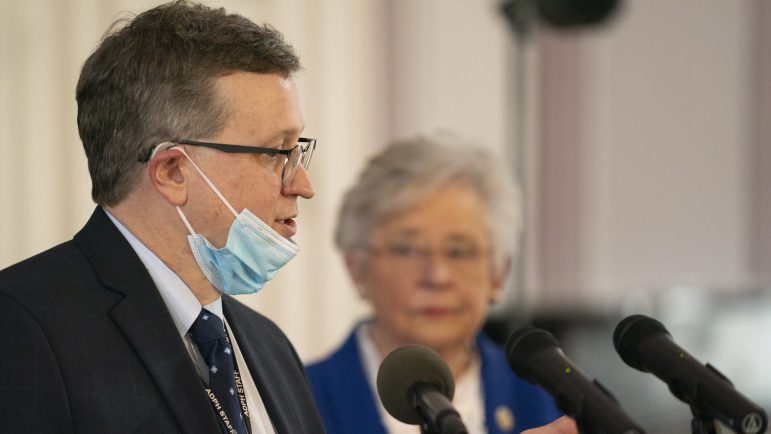Frustration Grows With Alabama’s Slow Vaccine Rollout
Alabama health officials have faced mounting criticism this week about the slow rollout of COVID-19 vaccines. The state ranks near the bottom nationwide in per capita vaccinations and it has administered less than half of available doses. That has left people around the state frustrated and confused.
Moving At Different Speeds
At the Auburn University Medical Clinic, director Dr. Frederick Kam said when the clinic got its first and only shipment of COVID vaccines a few weeks ago, it was a surprise.
“We did not know that it was arriving that morning,” Kam said.
He and his staff stopped everything and got to work.
“It took a lot of quick phone calls, multiple phone calls, some emails and coordination, so that we could start, literally, injecting people that afternoon,” he said.
The university received 3,500 doses to vaccinate people on campus. Without a large hospital or a significant elderly population, the clinic adapted state eligibility criteria to administer its allotment.
While most places in Alabama are offering vaccines to people aged 75 and up, Auburn is vaccinating people 65 and older. It is also giving doses to faculty and students with underlying health conditions.
“We’re probably moving more rapidly than the state’s laid out phases,” Kam said, “but still within the spirit and intent of protecting people at high risk.”
It is normal for clinics and hospitals to move at different speeds as they deliver vaccines, according to Claire Hannan, director of the Association of Immunization Managers, a nonprofit that includes representatives from state health departments.
“Who they vaccinate is kind of based on how many doses they have,” Hannan said. “So you see some counties and some states opening it up to more people earlier because they don’t want vaccine to sit on the shelf. So that can be confusing.”
Supply, Demand, Confusion
In Alabama, some doses have been sitting on the shelf, prompting recent action by the Alabama Department of Public Health (ADPH). The department announced this week that it will redistribute vaccine doses that are not used within a certain timeframe.
Still, many people are frustrated.
Earlier this week, four state lawmakers, including state Sen. Jim McClendon, released a public letter asking why vaccinations are moving slower in Alabama than almost anywhere else.
McClendon said he has tried to learn more from state health officials.
“I never could get an answer,” he said, “or understand the answer to explain why we’re not doing a good job.”

ADPH officials have repeatedly said supply is the issue, yet as of Thursday evening, more than half the state’s vaccine doses remain unused.
State health officer Dr. Scott Harris said those vaccines might not have been administered yet, but they are reserved, mostly for those awaiting second doses.
He said most hospitals have used all of their allotment and are waiting for more, but the state receives a limited supply from the federal government every week — 50,000 to 60,000 doses — a number Harris doesn’t expect to change anytime soon.
Harris said he understands the frustrations.
“People certainly have a right to expect that we could do things faster,” he said during a press conference Thursday. “I think we can also do things faster, and so we have several things that we’re implementing to make sure that happens.”
He said county health departments are working to vaccinate people “all day, every day.” He also said Alabama will soon partner with Walmart pharmacies to help administer vaccines, though no start date has been announced.
Lack Of Guidance
While Alabama stands out nationally, many places across the country are struggling with the rollout. Tom Denny, CEO of the Duke Human Vaccine Institute, said federal officials are mostly to blame.
“I think the flaw was that planning was left to states and individual municipalities, or areas, to do this,” Denny said. “And, you know, some things are best done locally, but they need resources to do it.”
He said states have not gotten enough resources or guidance from the federal government. And health departments and hospitals have been busy handling the pandemic.
Denny is hopeful that the Biden administration will speed things up and offer more assistance.
For now, Alabama health officials said they are doing the best they can.
Birmingham is 3rd worst in the Southeast for ozone pollution, new report says
The American Lung Association's "State of the Air" report shows some metro areas in the Gulf States continue to have poor air quality.
Why haven’t Kansas and Alabama — among other holdouts — expanded access to Medicaid?
Only 10 states have not joined the federal program that expands Medicaid to people who are still in the "coverage gap" for health care
Once praised, settlement to help sickened BP oil spill workers leaves most with nearly nothing
Thousands of ordinary people who helped clean up after the 2010 BP oil spill in the Gulf of Mexico say they got sick. A court settlement was supposed to help compensate them, but it hasn’t turned out as expected.
Q&A: How harm reduction can help mitigate the opioid crisis
Maia Szalavitz discusses harm reduction's effectiveness against drug addiction, how punitive policies can hurt people who need pain medication and more.
The Gulf States Newsroom is hiring a Community Engagement Producer
The Gulf States Newsroom is seeking a curious, creative and collaborative professional to work with our regional team to build up engaged journalism efforts.
Gambling bills face uncertain future in the Alabama legislature
This year looked to be different for lottery and gambling legislation, which has fallen short for years in the Alabama legislature. But this week, with only a handful of meeting days left, competing House and Senate proposals were sent to a conference committee to work out differences.







